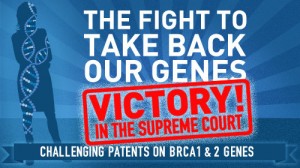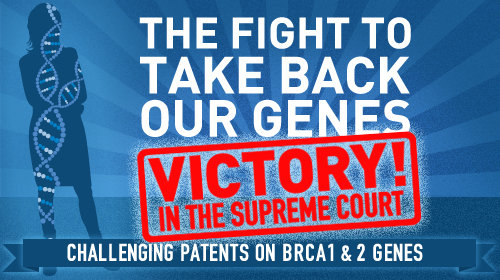By Pete Shanks and Marcy Darnovsky
Originally published on Biopolitical Times
 The Supreme Court’s June 13, 2013 unanimous ruling against Myriad Genetics is a triumph for common sense and the common good, and for scientific research and legal fundamentals as well. The decision means that all of the existing patents on human genes – some 15,000 of them – are no longer valid. It affirms a century of legal precedent that prohibits patents on “products of nature.” And it puts US law in line with the assertion of UNESCO, the World Medical Association, and the Human Genome Organization that the human genome is part of the “common heritage of humanity.”
The Supreme Court’s June 13, 2013 unanimous ruling against Myriad Genetics is a triumph for common sense and the common good, and for scientific research and legal fundamentals as well. The decision means that all of the existing patents on human genes – some 15,000 of them – are no longer valid. It affirms a century of legal precedent that prohibits patents on “products of nature.” And it puts US law in line with the assertion of UNESCO, the World Medical Association, and the Human Genome Organization that the human genome is part of the “common heritage of humanity.”
The Supreme Court cut through a tangle of legalistic confusion to assert that “a naturally occurring DNA segment is a product of nature and not patent eligible merely because it has been isolated.” The Court explicitly avoided ruling on “method claims” or “new applications of knowledge” [italics in the judgment; PDF here]. This seems reasonable – researchers can freely investigate isolated DNA but can presumably only patent something they invent.
However, the Court said that patents on so-called cDNA may be allowable, as long as these synthetic copies of DNA are not “obvious.” The interpretation of this aspect of the decision may take some time to clarify.
The ruling in the lawsuit, argued by the ACLU and Public Patent Foundation on behalf of a group of plaintiffs including researchers, genetic counselors, women’s health organizations, and breast cancer patients, should significantly bring down the bloated cost of Myriad’s test for genes that elevate the risk of breast cancer. And it will reassure scientists doing basic genetic research that they won’t be sued for patent infringement.
It is not immediately clear what the broader effect of the ruling will be on the gene testing industry, and on public understanding of what gene tests can and can’t do. The publicity about the gene patent case and Angelina Jolie’s revelation about her own BRCA status may have obscured the fact that these alleles account for only about 10% of breast cancers. The Supreme Court ruling by no means implies that most people should feel more inclined to rely on a gene test to predict their chances of developing cancer or other common diseases.
Moreover, gene testing companies, including Myriad, are already moving toward techniques that remain eligible for patent protection. Myriad has announced a “next-generation test” (to be launched this fall) called myRisk. This “will include a 25-gene panel that is focused on clinically-actionable cancers including: breast, colon, ovarian, endometrial, pancreatic, prostate and melanoma.” The test “will have a turnaround time of 14 days or less and a list price between $4,000 and $4,500.”
But the genetic links to risk for these other cancers are not nearly as clear as for the BRCA association with breast and ovarian cancer.
The battle to reap the benefits of genetic technologies – and avoid their misuses – is in its early days. But make no mistake about it: The Supreme Court decision is a hugely important step toward reclaiming biotechnology for the common good.
